Being a responsible pet owner means prioritising your dog’s health. The Parvo virus in dogs, scientifically named Canine Parvovirus (CPV), is a highly contagious and life-threatening disease that primarily attacks unvaccinated puppies and dogs, causing severe vomiting, bloody diarrhoea, and dehydration. Early symptoms like lethargy and loss of appetite demand urgent veterinary care; delay reduces survival chances from 90% to below 20%. Treatment includes IV fluids, antibiotics, and advanced therapies like monoclonal antibodies. Recovery takes weeks, requiring careful nutritional support.
At Petyaari Pet Clinic, we emphasise prevention of parvo virus through complete vaccination (starting at 6-8 weeks) and strict hygiene is crucial, as the virus can survive in environments for months. Trust Petyaari for expert CPV care, from diagnostics to emergency treatment. Protect your pet: vaccinate, disinfect, and act fast at the first sign of illness.
What Exactly is Canine Parvovirus (CPV) in Dogs?
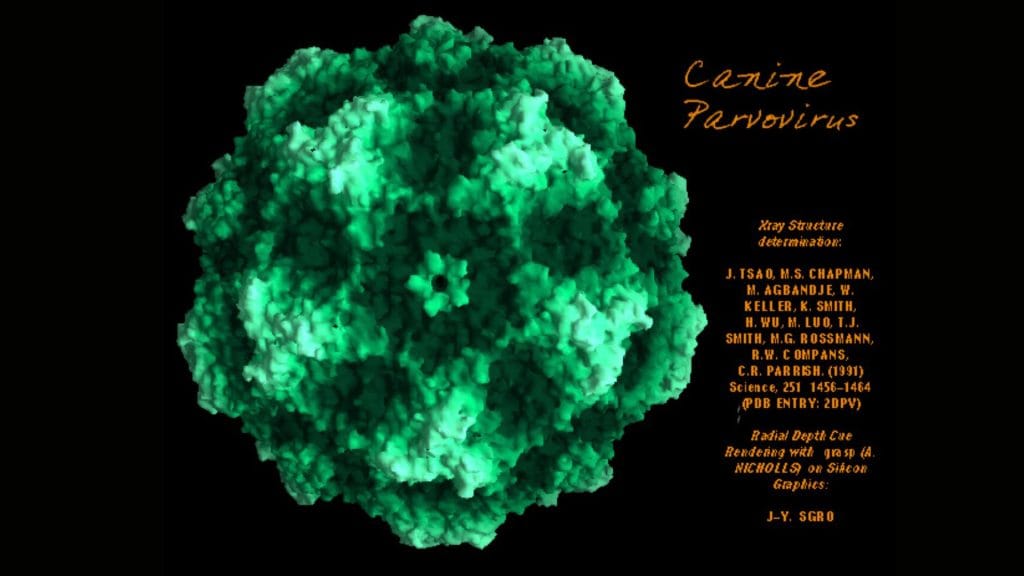
from the Institute for Molecular Virology
Canine Parvovirus (CPV), often referred to as parvo virus, is a highly resilient DNA virus belonging to the Parvoviridae family. It was first identified in the late 1970s and is known for its ability to survive in harsh environments.
How Does CPV Affect Dogs?
This dangerous virus primarily targets and attacks rapidly dividing cells within a dog’s body. The most affected areas are the intestines and, in young puppies, the heart muscle.
- Severe Enteritis: Inflammation of the intestines, leading to symptoms such as vomiting and diarrhea.
- Myocarditis: Inflammation of the heart muscle, which can be life-threatening in young puppies.
How Does Canine Parvovirus Spread?
The most prevalent strains, CPV-2a and CPV-2b (and CPV-2c), spread through several key routes:
- Direct contact: Close interaction with a dog infected with the parvo virus.
- Contaminated environments: Contact with surfaces like floors, bedding, clothing, food and water bowls, leashes, or collars that harbor the virus.
- Faecal-oral route: Exposure to infected faeces, even in microscopic amounts.
- Human Transmission (Fomites): Unwashed hands, clothing, or shoes of individuals who have handled an infected dog or contaminated environments.
- Shared Items: Using accessories such as food/water bowls, leashes, or grooming tools that have been exposed to the parvo virus.
While the parvo virus is not airborne, its ability to persist on surfaces for extended periods makes it a significant threat, especially in multi-dog households, shelters, pet boardings, kennels or areas with suboptimal hygiene.
Who Is Most At Risk?
Puppies between 6 and 20 weeks of age, as well as certain breeds like Rottweilers and Doberman Pinschers, exhibit increased vulnerability. This is often due to their developing or inherently weaker immune systems when facing this virus.
Unvaccinated dogs, particularly puppies whose maternal antibody protection has waned, are at the highest risk of contracting parvo virus. Outbreaks of this devastating virus can occur, especially in communities where pet vaccination rates decline, a trend observed during events like the COVID-19 pandemic.
At Petyaari Pet Clinic, we strongly emphasise parvo virus prevention through comprehensive vaccination protocols and diligent hygiene practices to safeguard your pet.
Early Parvo Virus Symptoms: Key Indicators in Puppies and Dogs
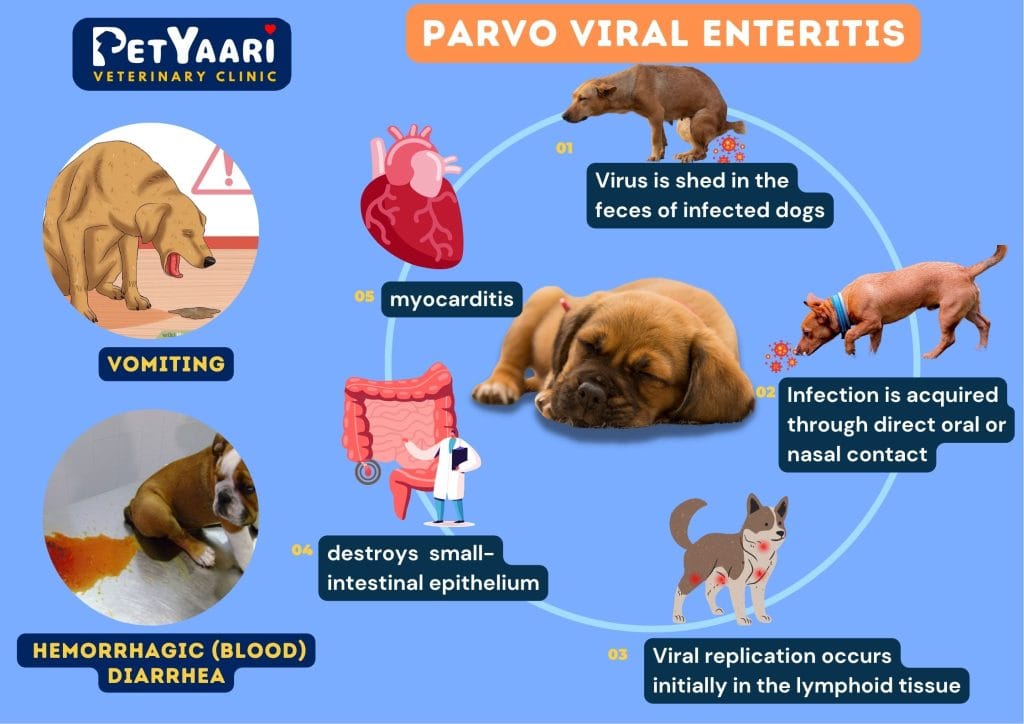
Promptly recognizing parvo symptoms in puppies or adult dogs is critical for timely intervention and a better prognosis. Be vigilant for the following signs of parvo virus:
- Significant lethargy or depression
- Sudden loss of appetite (anorexia)
- Persistent vomiting (sometimes with nausea)
- Severe, often bloody, diarrhoea (hemorrhagic)
- Noticeable abdominal pain (your dog may have a ‘tucked-up’ abdomen)
- Signs of dehydration (e.g., dry gums, sunken eyes, loss of skin elasticity)
- Fever (though not always present)
These distressing parvo symptoms manifest as the virus aggressively destroys the intestinal lining, leading to characteristic hemorrhagic diarrhoea (bloody loose motions), and attacks the bone marrow, which results in leukopenia (a dangerously low white blood cell count).
If you notice any of these signs indicative of parvo virus, it is imperative to seek immediate veterinary care at Petyaari.
The virus aggressively destroys the intestinal lining, leading to characteristic hemorrhagic diarrhoea (bloody loose motions), and attacks the bone marrow, which results in leukopenia (a dangerously low white blood cell count). If your dog exhibits any of these signs indicative of parvo virus, it is imperative to seek immediate veterinary care at Petyaari Pet Clinic.
Diagnosing Parvo Virus: Our Approach at Petyaari Pet Clinic

Finding out if your pet has parvo quickly and correctly is very important. This helps us start the right treatment fast, which can help your dog get better. At our pet clinic, Petyaari, we use a bunch of tools to check for parvo:
- Rapid Antigen Tests (SNAP Test): This is a quick test we do at the clinic. It checks for pieces of the virus in a poop sample.
- PCR (Polymerase Chain Reaction) Testing: This is a very accurate test that checks for the virus’s genetic material. We use this if we’re not sure about the results from the quick test.
- Complete Blood Count (CBC): This is a blood test that checks if the white blood cell count is low. This is often a sign of parvo.
- ELISA and Hemagglutination Assays: These are lab tests that can find virus pieces or antibodies. They give us more information about the infection.
Our friendly vets are dedicated to finding out if your dog has parvo as quickly and accurately as possible. This allows us to start treatment right away, which can greatly help your dog’s recovery.
Expert Parvo Virus Treatment Offered at Petyaari Pet Clinic
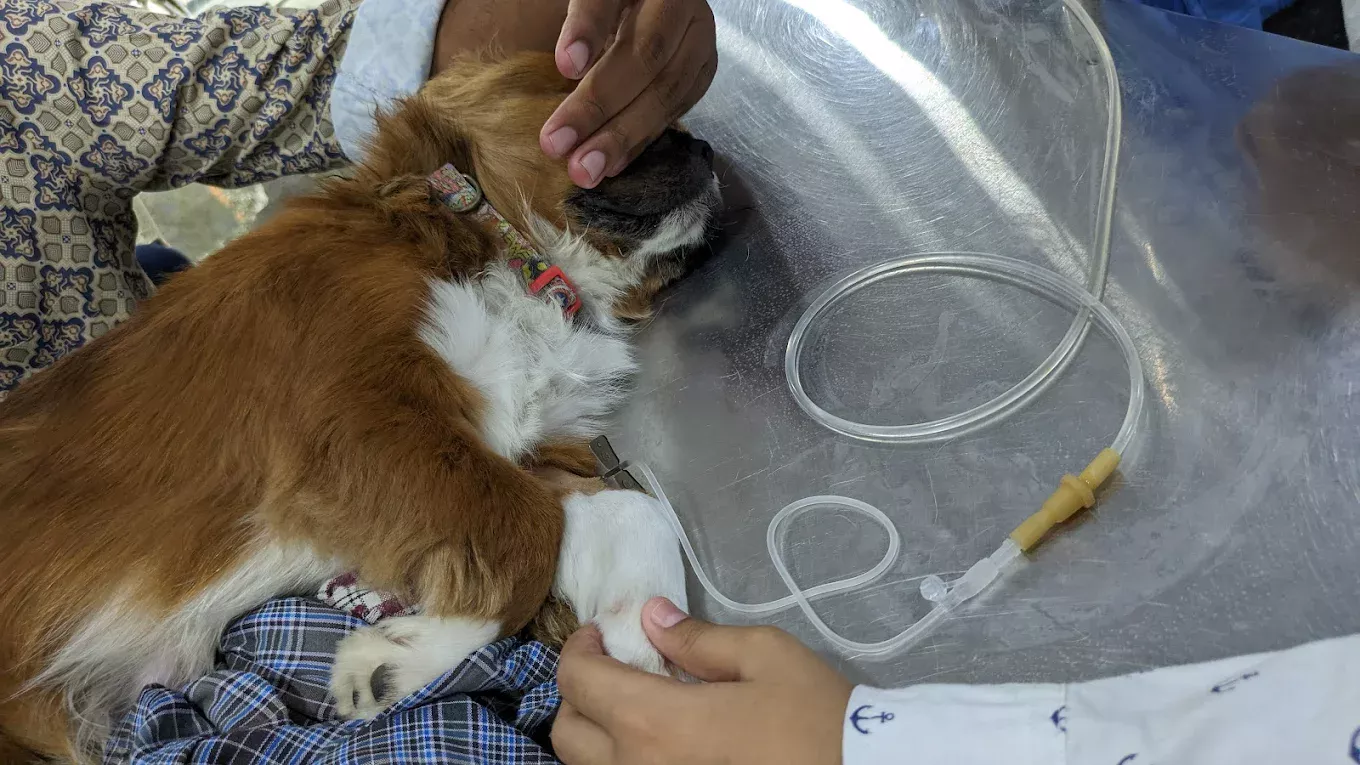
Parvovirus in dogs is a serious condition that requires intensive veterinary care. At the Petyaari Pet Clinic, we offer a comprehensive Parvo treatment plan for dogs affected by parvovirus.
Our protocol includes:
- Intravenous Fluid Therapy: This is crucial for tackling severe dehydration and fixing critical electrolyte imbalances caused by constant vomiting and diarrhea.
- Antiemetic Medications: We use drugs like Ondansetron and Maropitant to control extreme nausea and vomiting.
- Antibiotics: We administer broad-spectrum antibiotics, such as Ampicillin and Cefazolin, to prevent or treat secondary bacterial infections, common due to the damaged intestinal lining.
- Probiotics and Gut Health Support: These are given to restore the beneficial gut flora disrupted by the parvovirus.
- Canine Parvo Monoclonal Antibody (CPMA) Therapy: This innovative intravenous treatment is designed to neutralize the parvovirus within the dog’s system, which can reduce the severity of the illness and shorten the hospital stay.
- Targeted Nutritional Support: We provide carefully managed diets or, in severe cases, use feeding tubes to supply essential nutrients and support healing.
Emergency facilities at Petyaari Pet Clinic provide constant, expert monitoring and strict isolation protocols to prevent the spread of the parvo virus. This level of care offers much-needed peace of mind for concerned pet owners during a stressful time.
Can You Treat Parvo at Home?
Often, pet owners wonder “Can parvo be treated at home?” or “How to cure parvo at home?”. Unfortunately, home treatment for parvo is not advisable and can be quite dangerous. Parvo can cause serious dehydration, electrolyte imbalances, and secondary infections that require intensive veterinary care. There are no proven home remedies or over-the-counter solutions for parvo. Attempting home treatment with fluids, natural remedies, or untested medications can worsening your dog’s condition and delay urgent care.
Home treatment fails because parvo necessitates precise monitoring, sterile equipment, and isolation, which can only be managed in a veterinary setting. If you suspect your dog has parvo, immediately reach out to Petyaari Pet Clinic for professional assistance.
Parvo Treatment Cost
The cost of treating parvo can vary based on the severity of the disease, the age of the dog, and the duration of hospitalisation. At Petyaari Pet Clinic, the costs typically cover diagnostics, hospitalisation, medications and IV fluids, and nutritional support.
The total cost of parvo treatment can range from INR 1500 to INR 7000 per day, and the total treatment cost can exceed INR 7000 to INR 25000. The costs can range from moderate to high due to the need for intensive care, but early treatment can decrease expenses by reducing recovery time.
Contact Petyaari Pet Clinic at +91-9959337244 for a detailed estimate tailored to your dog’s needs. Investing in professional care significantly increases your dog’s chances of survival.
Parvo Survival Rate
The survival rate of parvo, a serious disease in dogs, is largely dependent on the speed at which treatment is initiated. With rapid and comprehensive veterinary intervention, between 70% to 90% of dogs can survive this illness.
Several factors can affect survival rates such as early diagnosis, aggressive treatment involving IV fluids, CPMA, and antibiotics, as well as the age and overall health of the dog. Without treatment, survival rates drop significantly, often below 20%, due to dehydration, sepsis, or shock.
At Petyaari Pet Clinic, we utilise advanced diagnostic tools and offer emergency services, significantly improving parvo survival rates. Don’t hesitate to seek help at the first sign of symptoms.
Parvo Recovery Signs
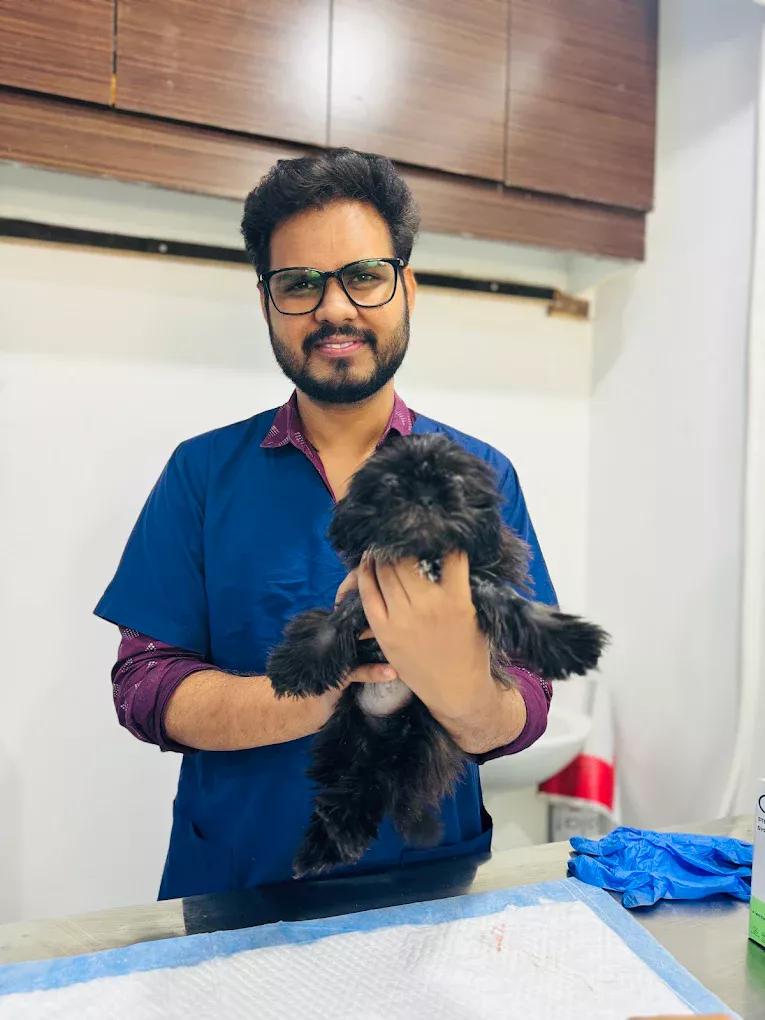
Recognising signs of parvo recovery is key for pet owners. These signs include:
- Improved Energy: Less lethargy and more interest in surroundings.
- Appetite Return: A willingness to eat small amounts of bland food.
- Decreased Vomiting/Diarrhoea: A stop in vomiting and less bloody, more formed stools.
- Hydration Improvement: Normal skin elasticity, moist gums, and an overall better appearance.
- Stable Vital Signs: Normal temperature and improved blood test results.
we closely monitor these signs during hospitalisation and provide guidance post-discharge. Full recovery may take weeks, but these signs show progress.
Parvo Recovery Timeline
The recovery timeline from parvo can vary, largely depending on the dog’s condition and the promptness of treatment. Generally, the timeline can be divided into four stages:
- Days 1-3: Parvo is confirmed and intensive care begins. Dogs are often in critical condition during this phase.
- Days 4-7: With appropriate treatment, symptoms such as vomiting and diarrhoea decrease, and energy levels may improve.
- Days 7-14: Dogs begin to eat and their stools normalise. Some dogs may be discharged with strict instructions for at-home care.
- 2-4 Weeks: Most dogs regain their normal energy and weight, with gut healing possibly taking longer.
we aim to shorten the recovery timeline through prompt emergency care and thorough follow-up support.
Nutritional Support: A Key Part of Parvo Virus Recovery
The parvo virus significantly damages a dog’s intestinal lining. As a result, it’s crucial to carefully manage their diet to aid their recovery. At Petyaari Pet Clinic, we have a nutritional support strategy for dogs recovering from parvo:
- Initial NPO (Nil Per Os/Nothing By Mouth): A temporary period where all food and water are withheld to allow the irritated gut to rest and help control vomiting.
- Gradual Reintroduction of Hydration and Food: Once vomiting stops, small amounts of water or ice chips are provided, followed by easily digestible, bland foods (ex. boiled chicken and rice in small, frequent meals).
- Prescription Therapeutic Diets: Specialised veterinary diets formulated (VetPro Recovery Gravy or VetPro Gastrointestinal Gravy) to be gentle on the recovering gastrointestinal system and promote healing.
- Assisted Feeding (If Necessary): For dogs with severe anorexia or inability to eat voluntarily, temporary feeding tubes (such as nasoesophageal or nasogastric tubes) may be used to ensure adequate caloric and nutrient intake.
Parvo Virus Prevention: Your Best Defence (with Petyaari Pet Clinic)
Preventing parvo virus is always far easier, less traumatic, and more cost-effective than treating an active infection. To effectively protect your dog from this dangerous virus, Petyaari Pet Clinic recommends the following key preventive measures:
- Timely Puppy Vaccinations: Ensure your puppy completes the full series of Canine Parvovirus (CPV) vaccines (preferably 9 in 1), typically starting at 6-8 weeks of age, with boosters administered every 3-4 weeks until they are at least 16 weeks old. Here is the Dog Vaccination Schedule.
- Adult Dog Booster Vaccinations: Maintain immunity with regular booster vaccinations as recommended (often annually, but sometimes tailored to individual risk).
- Minimise Exposure for Vulnerable Dogs: Keep unvaccinated or partially vaccinated puppies away from high-traffic dog areas and contact with dogs of unknown vaccination status until their primary vaccine series is complete.
- Practice Diligent Hygiene: Regularly disinfect potentially contaminated surfaces. Effective disinfectants against parvo virus include a 1:30 or 1:32 dilution of household bleach (ensure surfaces are clean first and allow proper contact time of at least 10 minutes) or veterinary-grade disinfectants like accelerated hydrogen peroxide.
- Isolate Sick Dogs Immediately: If a dog is suspected or confirmed to have parvo virus, they must be strictly isolated from other dogs, with dedicated food/water bowls, bedding, and cleaning protocols to prevent further spread.
At Petyaari Pet Clinic, we provide custom puppy vaccination schedules, adult dog booster plans. Consider taking vaccination at Petyaari Pet Clinic for timely pet vaccination reminders via sms and email.
Why Choose Petyaari Pet Clinic for Parvo Virus Care?
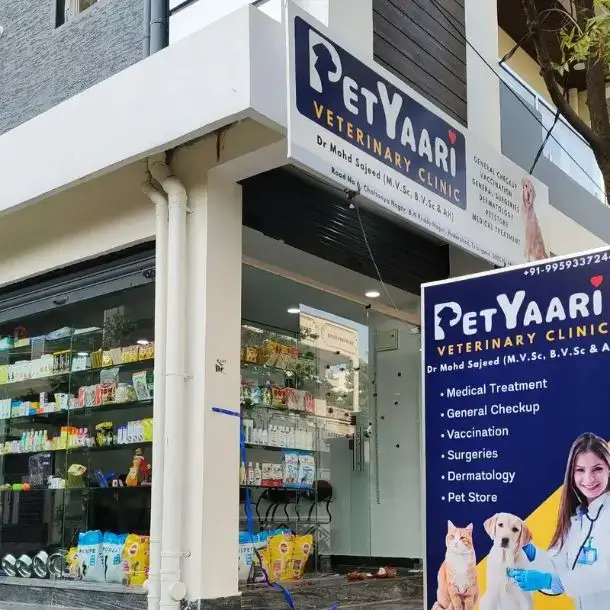
When your dog’s health is threatened by parvo virus, choosing the right veterinary partner is crucial. Petyaari Pet Clinic stands out as a leader in parvo treatment for dogs because:
- Advanced Diagnostic Capabilities: We utilise rapid and precise testing methods for early parvo virus detection, enabling immediate and effective intervention.
- Comprehensive and Cutting-Edge Treatment: Our clinic offers a full spectrum of care, from essential IV fluid therapy and nutritional support to advanced treatments like Canine Parvo Monoclonal Antibody (CPMA).
- 24/7 Emergency and In-Patient Care: Our state-of-the-art in-patient facilities are staffed and equipped for round-the-clock monitoring and intensive care for critical parvo cases.
- Experienced and Compassionate Team: We understand the distress the parvo virus causes. Our dedicated veterinarians and staff guide pet owners through every step of diagnosis, treatment, and recovery with empathy, clear communication, and unparalleled expertise.
Frequently Asked Questions (FAQs) About Parvo Virus in Dogs
What causes parvo in dogs?
Parvo virus in dogs is caused by specific strains of Canine Parvovirus (most commonly CPV-2a, CPV-2b, and CPV-2c). It spreads through direct contact with an infected dog, or more commonly, through exposure to infected faeces or contaminated environments and objects (fomites).
What are the early signs of parvo?
Key early parvo symptoms include severe lethargy, sudden loss of appetite, vomiting, and acute (often bloody) diarrhoea. Abdominal pain may also be evident. If you notice these signs, prompt veterinary care is absolutely essential for your dog.
How is parvo diagnosed?
Parvo virus is typically diagnosed through a combination of clinical signs and specific tests, such as in-clinic rapid antigen (SNAP) tests on a faecal sample, more sensitive PCR testing, and blood tests (like a CBC) to check for characteristic low white blood cell counts.
Can dogs survive parvo?
Yes, many dogs can and do survive parvo virus, especially with early diagnosis and aggressive, supportive veterinary treatment. Survival rates can be as high as 70-90% with intensive care like that provided at Petyaari Pet Clinic, which significantly improves a dog’s prognosis when battling parvo.
How can I prevent parvo?
The best way to prevent parvo virus in dogs is through proper and timely vaccination, starting when they are puppies and continuing with boosters as recommended by your vet. Additionally, maintaining good hygiene (disinfecting surfaces, washing hands) and avoiding exposure of unvaccinated puppies to high-risk environments or dogs with unknown vaccination histories are crucial parvo prevention strategies. Schedule a visit with Petyaari Pet Clinic for a tailored parvo virus vaccination plan for your dog.
Can a vaccinated dog get parvo?
Yes, rarely vaccinated dogs can still get parvo, especially if their vaccination is incomplete, maternal antibodies interfere, booster shots are missed, or a new strain like CPV-2c is involved. However, vaccination greatly reduces the risk and severity. Keeping vaccinations up to date is key.
Suspect Parvo Virus? Act Immediately to Protect Your Dog!
Parvo virus in dogs is a serious, potentially fatal disease, but it is also preventable and often treatable with prompt action. If you suspect your puppy or adult dog is showing any symptoms of parvo virus, do not delay – contact Petyaari Pet Clinic immediately. Our emergency veterinary services are prepared to provide critical, life-saving care.
For robust parvo virus prevention, book a vaccination appointment with us today to ensure your beloved pet stays safe and healthy.
Call us now at +91-9959337244 or visit schedule your appointment.
Trust the expertise at Petyaari Pet Clinic for comprehensive parvo virus treatment and dedicated preventive care, helping your dog live a long, healthy, and happy life!
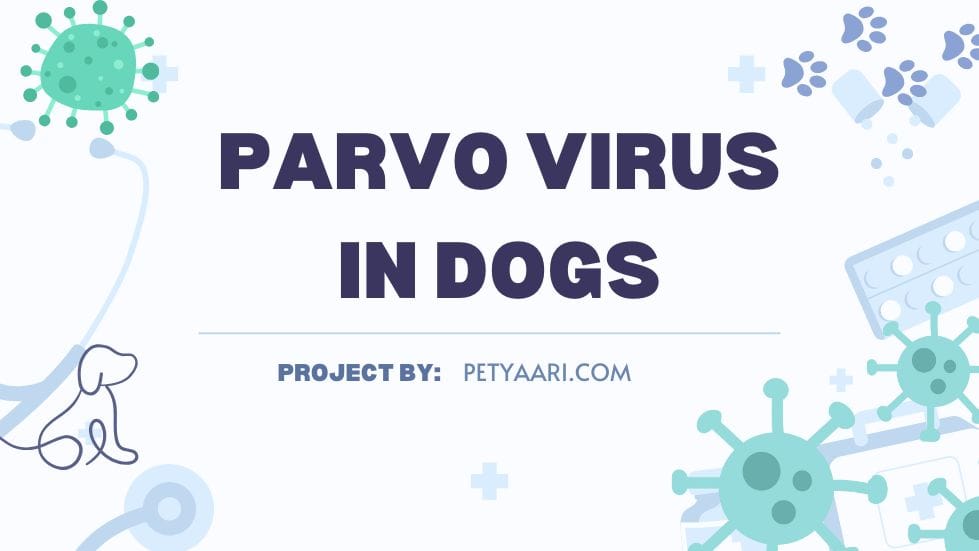
Good article helpful to vets
Thank you so much, Pardiva Krishna! We’re really glad you found the article helpful. Our goal is to support both pet parents and fellow vets with reliable, practical information. Feel free to share it with others who may benefit. 🐶💉📚